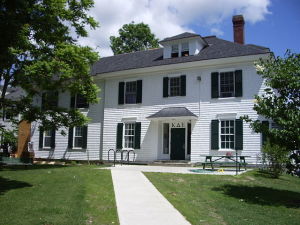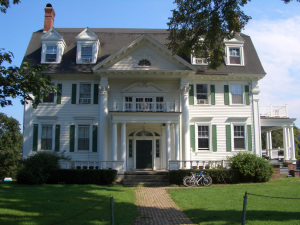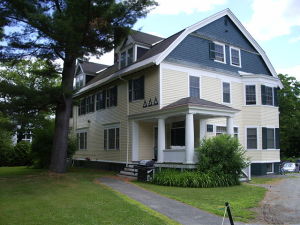Jake G. Rascoff also contributed to this profile.
Editor’s Note: In light of the overwhelming negative press coverage of the College’s Greek system in local and national publications, The Dartmouth Review seeks to introduce some positivity into the dialogue. In this installment, the first in a series of profiles of individual Greek houses, The Dartmouth Review focuses on the philanthropic and community-building efforts of three Greek houses: Kappa Delta Epsilon, Phi Delta Alpha, and Delta Delta Delta. This series is not intended to refute the claims of the Greek system’s detractors. Rather, it seeks to emphasize the positive value that Greek organizations can—and already do—add to the Dartmouth community: value that has been largely ignored in the broader discussion of the Greek system’s future at Dartmouth.
Kappa Delta Epsilon
Kappa Delta Epsilon sorority, or “KDE,” is one of three local sororities—unaffiliated with national organizations—among Dartmouth’s ten total sororities. Known for their outgoing nature (“Freedom Lies in Being Bold” is the de facto motto of the sorority), their tendency to don silly clothes they call “Tackiez,” and their strong sense of independence, the sisters of KDE claim ownership of one of the campus’ truly female-dominated social spaces.
KDE President Emily Uniman ’15 sees the sorority’s lack of a national affiliation as one of its greatest strengths. Without the onerous constraints posed on some of Dartmouth’s sororities by their national headquarters, the sisters of KDE are free to host parties, play pong in their basement, and open their doors to the student body on a nightly basis. “We operate much like a fraternity, but there is automatically a high ratio of females controlling the space,” said Uniman. “We give women on campus a space to feel comfortable, even if many of them are comfortable at fraternities. We give them a place to invite their friends, a place to call their own.” As a result of KDE’s local status, the sorority verily functions as an alternative social space to Dartmouth’s fraternities—a goal long promoted by the Hanlon administration. Additionally, it offers Dartmouth’s male undergraduates—whether affiliated with fraternities or not—a change of pace from the standard male-dominated social scene at the College. “When guys come to KDE, they’re able to leave the confines of their fraternity houses,” Uniman added. The attendant membership costs of operating as an open social space to campus are remedied through an internal scholarship fund; this term, KDE matched 100% of scholarship needs for membership dues.
In addition to providing the undergraduate student body with an important female-dominated social space, the KDE sisterhood benefits the Dartmouth community through its philanthropic efforts. Chief among these efforts is the annual Lead the Way 5K, benefitting the Selamta Family Project. KDE cosponsors the event with Alpha Delta fraternity, and just this month the event raised $27,611. Each year, proceeds from the event go to the Selamta Family Project, which provides permanent homes and families for Ethiopian children orphaned by HIV/AIDS. KDE requires community service involvement from its members in order to participate in the sisterhood’s social events. This fall, out of KDE’s 110 sisters, 90 of them participated in the Lead the Way 5K, while the other 20 sisters are participating in various other community service efforts.
Another way KDE improves the Dartmouth community is by hosting events open to the undergraduate student body. This fall, KDE hosted a panel for ‘18s on the Monday before Homecoming, to discuss how to navigate Dartmouth’s Greek spaces. In light of the six-week ban on freshmen entering Greek houses, the panel—comprised of both unaffiliated women and women affiliated with coed houses and sororities—sought to acknowledge the ‘18s’ shared presence in the community and to provide information on how to engage in safe behavior while in Greek houses. KDE also regularly hosts concerts and similar events, like the recent performance of a student band, Shark, and most terms the sorority sponsors a meaningful conversation facilitated by the Office of Pluralism and Leadership (OPAL).
KDE is dedicated to tackling the harmful behaviors that have informed the mission of the Presidential Steering Committee. The sorority designed an internal task force to address those behaviors, and this year created the position of Sexual Assault Officer: a sister formally trained to monitor for, and deal with, instances of sexual assault. KDE has also been a leader in the practice of posting signs with sorority officers’ names and phone numbers throughout the house and basement, ensuring that any occurrence of harmful behavior at a party can be appropriately reported and prevented. The sorority’s president hosts weekly office hours, where sisters can voice concerns about the direction of the house, internal issues, and larger campus issues. Similarly, the sorority’s advisor, Kristi Clemens of the Dean’s Office, meets with the sisterhood as a whole, so that the entire sorority (and not just the executive board of top officers) can voice concerns to directly to the administration.
The sisters of KDE deeply believe that their sorority can continue to contribute to a vibrant and constructive Dartmouth Greek community. “Right now, Greek life represents such a majority of our student body—for good or bad—that abolishing the system would leave a black hole in our social life,” said Uniman. “I don’t see a feasible end in the near future to college students drinking, nor the existence of sexual assault on college campuses; we’re better suited to work with the system in place to reduce those behaviors, instead of getting rid of the infrastructure itself.”
Phi Delta Alpha
Phi Delta Alpha, or “Phi Delt,” has a reputation around campus for its tight-knit brotherhood; its proclivity for playing music that predates the birth of its members by several decades; and its fondness for revelry. What is perhaps lesser known is the house’s dedication to philanthropy, academic involvement, and professional development.
Phi Delt’s largest philanthropic endeavor is The Prouty, New Hampshire’s largest charity fundraiser and a day of athletic events benefiting the Dartmouth-Hitchcock Norris Cotton Cancer Center. Phi Delt collaborates with nearly every other Greek house on campus to raise money for the event. However, for the past decade, Phi Delt has also acted as a liaison between the event’s organizers and Dartmouth’s Greek houses, coordinating the volunteering effort and dispersing information to the Greek community at large. Nearly all Phi Delt brothers contribute to the fundraising and volunteer in the event itself; for the past few years, Phi Delt has won the participation award for the event, awarded to the Greek organization with the highest percentage of members volunteering in the event. The Prouty is one of the highlights of the Greek community’s philanthropic efforts: in 2014 alone, Dartmouth’s fraternities and sororities raised $110,546 for the Dartmouth-Hitchock Norris Cotton Cancer Center. As a whole, the Greek system was the second-largest donor in a charity event that raised over $3 million for cancer research.
Phi Delt’s notable philanthropic efforts have also focused on women’s cardiovascular health. Last April, Alpha Phi sorority and Phi Delt planned to host their annual “Phiesta” fundraiser benefitting Alpha Phi Foundation’s Heart-to-Heart cardiac education and research funding program. After a student mistook the fundraiser for a Cinco de Mayo party and cried foul, accusing the Greek houses in charge of the event of appropriating Mexican culture, Phi Delt and Alpha Phi were forced to cancel the event. Instead of raising money by donation and the sale of Boloco’s “globally inspired” burritos, as was planned, Phi Delt and Alpha Phi moved the fundraiser to an online GoFundMe page. While the “Phiesta” fundraiser of 2013 raised a respectable sum of over one thousand dollars, the 2014 fundraising effort garnered just shy of $10,000: an amount nearly ten times that of the previous year.
In addition to these volunteering and fundraising efforts, Phi Delt contributes to the community more directly by coaching a little league team of Hanover middle schoolers: “The Little Riggers.” The Little Riggers compete in a league, run by Hanover Parks and Recreation, which plays soccer during the fall and baseball during the spring. Every fall and spring, four Phi Delt brothers comprise the coaching staff of the team, with each brother devoting about ten hours per week to practices and game time. In addition to the athletic aspect of coaching the team, the Phi Delt brothers serve as mentors to the middle schoolers. At the end of each season, Phi Delt hosts a barbeque on its front lawn for the little leaguers and their parents. “The kids joke about coming to a frat party, and the parents get to see how the Greek system at Dartmouth operates in a positive way,” said Phi Delt brother Derek DeWitt ‘15, a coach of several Little Riggers teams.
Phi Delt also encourages academic involvement among its brothers outside of the classroom, most notably through regular faculty lectures. This term, Phi Delt hosted Professor Ryan Hickox of the Department of Physics and Astronomy, who spoke to the brothers about observational astrophysics and black holes. Later this term, Professor Marlene Heck of the Art History department will speak to Phi Delt about architectural history. The brothers also take part in weekly discussion groups, in which an upperclassman speaks to the brotherhood about an academic or extracurricular passion of his.
Professional development is another aspect of the Phi Delt brotherhood. Phi Delt’s house advisor regularly runs resume and interview workshops, and occasionally pairs brothers with Phi Delt alumni involved in their areas of interest, thereby fostering mentorship relationships across generations of Phi Delts.
Phi Delt president and Review contributor, Taylor Cathcart ’15, characterizes the lasting bonds of brotherhood as one of the fraternity’s greatest strengths. “Phi Delt serves as a powerful conduit between the student body and alumni, creating a bridge between the two populations,” Cathcart said in an interview. “Phi Delt provides an environment where alumni feel connected through the current student body to their own time at Dartmouth. Shared experience and shared perspective is one of the hallmarks of Dartmouth; it’s what engenders such a powerful alumni network, and what inspires such fierce loyalty among Dartmouth grads.”
Delta Delta Delta
Delta Delta Delta sorority, or “Tri Delt,” is one of seven sororities at Dartmouth affiliated with national organizations. The sisterhood of Tri Delt is known for its wholesome values, its amiable demeanor, and its penchant for baking. Tri Delt’s national organization is at the forefront of philanthropy among Greek organizations and this philanthropic spirit manifests itself in Dartmouth’s chapter. Since 1999, Tri Delt’s national organization has partnered with St. Jude’s Children’s Research Hospital in its philanthropic endeavors. Earlier this year, the national organization pledged $60 million in 10 years to St. Jude’s, which will be paid by the efforts of all local chapters. This commitment marks the single largest pledge ever made to St. Jude’s and will add to the nearly $30 million raised by Tri Delt for the hospital since 1999.
Tri Delt at Dartmouth contributes to the philanthropic efforts of the national sorority through several fundraising events throughout the year. Each summer, the sorority hosts Pelt-a-Delta, a popular dodgeball tournament among the sophomores on campus for the summer term. In the spring, the sisters of Tri Delt sell pancakes in a fundraiser that has become a staple of Green Key Weekend, Delta House of Pancakes. This fall, for the first time, Tri Delt hosted a similar fundraiser called Delta House of Pasta. Tri Delt also hosts numerous smaller service events to raise money for St. Jude’s. For example, this fall Tri Delt raised $400 for St. Jude’s in four hours through a bake sale. The importance of charity work is instilled in the sisters of Tri Delt upon their induction into the sorority, and all sisters must meet a mandatory minimum of service in order to attend the sorority’s formal and other social events.
With a mix of old and new policies, Tri Delt has acted to reduce the high-risk behaviors that are of most concern to the Hanlon Administration: exclusivity, sexual assault, and high-risk drinking. To minimize the financial barriers to membership, Tri Delt has internal and external scholarship funds from the chapter and national, respectively, which aid sisters in paying off their membership dues. With regards to high-risk drinking and sexual assault, the sisterhood has a strong culture of looking out for one another at social events. In addition to this sisterhood custom, Tri Delt has designated officers to deal specifically with these issues. Each term, Tri Delt’s Risk Manager hosts a workshop to increase the sisterhood’s safety and security. This fall, the trained and qualified Risk Manager is holding a self-defense course for the sisters.
This fall, Tri Delt has enacted a new measure—the Safety Team Policy—to further the sisterhood’s safety initiatives. At every hour of semi-formal, tails, super tails, and formal, at least one monitor known to and easily contacted by all sisters is present to watch over the sisters and intervene when necessary to ensure a sister’s safety. Outside of Tri Delt’s social events, the Safety Team monitors send out their phone numbers to the sisterhood and make it clear that there is always someone who sisters can contact if they are in a bad or uncomfortable situation.
Tri Delt is also committed to ensuring the academic success and involvement of its sisters. According to the national organization, Tri Delt’s Committee on Standards or “Standards” is a disciplinary committee for cases like academic underperformance. However, because the Tri Delt sisters at Dartmouth have consistently been in good standing, the “Standards” committee has also transformed into a body that oversees the general well being of the sisters. “Sisters struggling with something that they’re uncomfortable making public, like sexual assault, financial problems, academic trouble, addiction, etc. can go to standards and the chapter provides resources,” said Tri Delt President Camila Vigdor ’15. If a sister’s GPA falls below the GPA required by the houses by-laws, “Standards” will work with the sister to improve her academic performance by setting up study hour and encouraging participation in Tri Delt study hours, which are hosted by Tri Delt’s Academic Chair. Outside of the classroom, Tri Delt encourages academic involvement by hosting faculty dinners at least once a term. This term, Tri Delt hosted Professor Lisa Baldez of the Government Department to discuss female empowerment and the position of women in the workplace.
According to Vigdor, one of Tri Delt’s most fundamental and important contributions to campus is a female-dominated social space on campus. “I’ve tried to find other social spaces for just women, and it’s difficult especially as a freshman if you’re not a good singer, athletically inclined, etc.,” Vigdor said. “Many other groups are interest based, like all-women investment and business groups. But there’s something to be said for a place where you can be open, be social (really making connections with other people, not just partying), be comfortable around other women.”
If you are affiliated in a Greek organization not already covered in this feature and would like to be covered in our next issue, please contact The Dartmouth Review at dartmouthrevieweditor@gmail.com.




Be the first to comment on "Fraternity and Sorority Profiles, Part I: KDE, Phi Delt, and Tri-Delt"